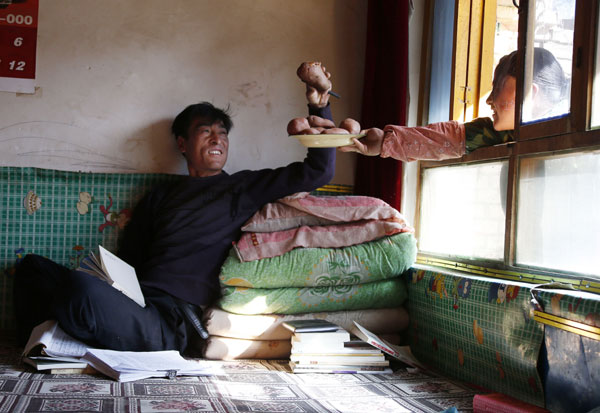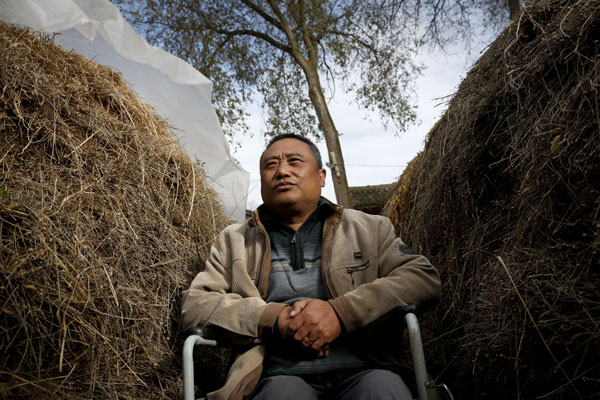Farmers harvest a crop of poetry
By Peng Yining (China Daily)
Updated: 2012-11-06 09:21
At 17, he fled his village and joined the local gangsters. At one point, he robbed a couple in town, taking 85 yuan, all the money they had. "The wife knelt and begged me not to take their money, saying they had worked a whole week to get it, but I didn't listen," he said. "This has become a source of great anxiety to me."
Kang, 35, whose parents are illiterate, dropped out of school when he was 15: "Nobody told me right from wrong or how to behave," he said. "I felt confused and guilty as I grew older, but I didn't have the courage to make a change."
 |
|
For rural poet Kang Pengfei, baked potatoes provide food for thought. Kuang Linhua / China Daily |
The writer from Xiji county said farming the arid, sandy soil is a gamble because irrigation depends on rainwater. If the rains failed to arrive, a whole year's backbreaking work would be in vain.
Potatoes form part of every meal, every day, washed down with boiled rainwater collected in a cistern, he said. Kang didn't see a future in planting potatoes, something his ancestors did for their entire lives.
"I cried reading that novel, and it convinced me to be a good person," he said. When he tried to return the book to the stall, the bookseller forgave him and gave him another book as a gift. "Read, and the power of literature will help you," the elderly man told Kang.
When he returned home, Kang started to keep a diary. He published his first poem, in a local literary journal in 1998. In 2003, his novella Night Bus won a national award.
He said writing wasn't easy for a farmer who hadn't even finished middle school, but he picked up his old textbooks and taught himself the long-forgotten characters. He wrote for a couple of hours every day, sometimes staying up all night and then going straight to his potato field.
In October, the morning temperature in Xiji drops below freezing. In the snow and low cloud shrouding the mountains behind his field, Kang and his wife were digging up potatoes. With enough rain, the 30 mu of potatoes would bring in more than 30,000 yuan, he said.
As he worked, he unearthed fresh potatoes, their red skins caked with mud. The workers built a small fire in the field and baked a potato for lunch. Soon they all were sweating, despite the cold. Kang removed his jacket and rolled up his sleeves. A fading butterfly tattoo, a symbol of his earlier gangster life, was clearly visible on his lower right arm.
"I admired a movie character nicknamed Butterfly, a petty criminal and a thief," he explained. "But now I want to get rid of the tattoo. I don't even wear T-shirts in summer."
Kang said he tried to persuade his "brothers" in the gang to live a normal life. "But they laughed at me, saying I had been brainwashed by a novel, and only dorks read books," he said. "One of them was recently sentenced to 13 years in prison for robbery.
"It could be me in that prison. Without literature, I wouldn't have discovered my life's purpose until it was too late," he said. "Writing doesn't bring me a fortune, but it does make me believe that a farmer can live a hopeful life."
Culture and tradition
Xiji has a population of 510,000, but there are 37 literature clubs and more than 200 published writers, including six members of the Chinese Writers Association and 31 from the provincial association, according to Guo Ning, director of Xiji's Literature and Art Association. As editor-in-chief of the biggest local literary magazine, Guo said he has received more than 25,000 e-mails from aspiring contributors during the past three years.
"Reading and writing is our culture and tradition," said Guo, "People also forge close links through literature."
Wang Xueyi, a 52-year-old who has been paralyzed since a scaffolding accident when he was 19, said he got his social life back through writing.
 |
|
Wang Xueyi, 52, who has been paralyzed for many years, published his first story in 1987. His home is often a gathering place for lovers of literature. |
Related Stories
The writer's hard life 2012-11-06 08:16
Writer Han Suyin dies at 95 in Lausanne 2012-11-05 15:48
Mo urges exposure for other Chinese writers 2012-10-31 17:29
Late writer's birthplace plans ambitious project 2012-10-26 15:58
Chinese writers sue Apple for copyright violation 2012-10-12 09:38

Top News
Xi emphasizes adherence to CPC Congress spirit
Top legislator urges implementation of congress spirit
Moderately prosperous China brings chances to world
Video







